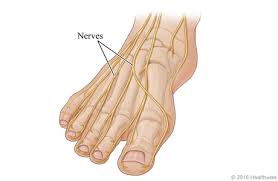Experiencing nerve blockage in the leg can be incredibly uncomfortable and frustrating. This condition, often associated with symptoms like pain, tingling, and numbness, can affect your daily life significantly. Fortunately, there are effective treatments available that can help alleviate these symptoms and improve your quality of life. In this article, we'll explore various treatments for leg nerve blockage, focusing on solutions that are accessible and practical.
Nerve blockage in the leg occurs when there is compression or irritation of nerves, leading to impaired function. This condition is often linked to underlying health issues such as diabetes, where high blood sugar levels can damage nerves over time. Other causes may include injuries, infections, or certain medical conditions that affect nerve health.
Common Symptoms
When nerves in the leg are blocked or compressed, you might experience:
-
Persistent pain or burning sensation
-
Tingling or "pins and needles" feeling
-
Numbness in the leg or foot
-
Muscle weakness
-
Difficulty walking or maintaining balance
If these symptoms sound familiar, it's essential to seek medical advice to determine the underlying cause and appropriate treatment.
Lifestyle Changes and Home Remedies
Making certain lifestyle changes can significantly impact the management of nerve blockage symptoms. Here are some practical steps you can take:
Maintain a Healthy Diet
A balanced diet rich in vitamins and minerals can support nerve health. Focus on foods high in antioxidants, like fruits and vegetables, which can help reduce inflammation and promote healing.
Regular Exercise
Engaging in regular physical activity can improve blood circulation and strengthen muscles, which may help alleviate symptoms. Activities such as walking, swimming, or yoga are gentle on the joints and can be particularly beneficial.
Foot Care
For individuals with diabetes, proper foot care is crucial. Keep your feet clean and dry, and inspect them regularly for any cuts or blisters. This can prevent infections that may worsen nerve damage.
Medical Treatments for Nerve Blockage
When lifestyle changes are not enough, medical interventions may be necessary. Here's a look at some common medical treatments:
Medications
Doctors often prescribe medications to manage pain and inflammation associated with nerve blockage. These may include:
-
Anti-inflammatory drugs
-
Pain relievers
-
Antidepressants or anticonvulsants for neuropathic pain
Always consult with a healthcare provider before starting any new medication.
Physical Therapy
Physical therapy can be incredibly effective in managing nerve blockage symptoms. A trained therapist will guide you through exercises designed to strengthen muscles, improve flexibility, and reduce nerve compression.
Nerve Block Injections
For more severe cases, nerve block injections may be recommended. These injections deliver medication directly to the affected nerve, providing temporary relief from pain and inflammation.
Specialised Footwear for Neuropathy
Wearing the right footwear can make a significant difference for those with nerve blockage in the leg. Specialised neuropathy shoes or diabetic footwear are designed to provide extra support and cushioning, reducing pressure on sensitive areas.
Features to Look For
When selecting neuropathy or diabetic shoes, consider the following features:
-
Extra depth and width to accommodate swollen feet
-
Soft, cushioned insoles to absorb shock
-
Seamless interiors to prevent irritation
-
Adjustable closures for a secure fit
These features can help alleviate discomfort and prevent further nerve damage.
Advanced Treatment Options
In some cases, advanced treatments may be necessary to address nerve blockage in the leg:
Surgery
Surgical intervention might be considered if other treatments fail to provide relief. Surgery aims to relieve pressure on the affected nerve, restoring normal function.
Alternative Therapies
Some people find relief from nerve blockage symptoms through alternative therapies such as acupuncture or chiropractic care. While these approaches may not work for everyone, they can be worth exploring as complementary treatments.
Managing Brain Nerve Block Symptoms
Although this article focuses on leg nerve blockage, it's important to address brain nerve block symptoms briefly. These can include headaches, vision changes, or difficulty concentrating. If you experience any of these symptoms, it's crucial to seek medical attention immediately.
Conclusion
Nerve blockage in the leg can be challenging to manage, but with the right approach, you can find relief from symptoms and regain your quality of life. By incorporating lifestyle changes, exploring medical treatments, and investing in specialised footwear, you'll be well on your way to managing this condition effectively. Always consult with a healthcare professional to determine the best course of action for your specific situation.
Remember, early intervention is key to preventing further nerve damage and improving outcomes. Don't hesitate to seek help and take control of your health today.








